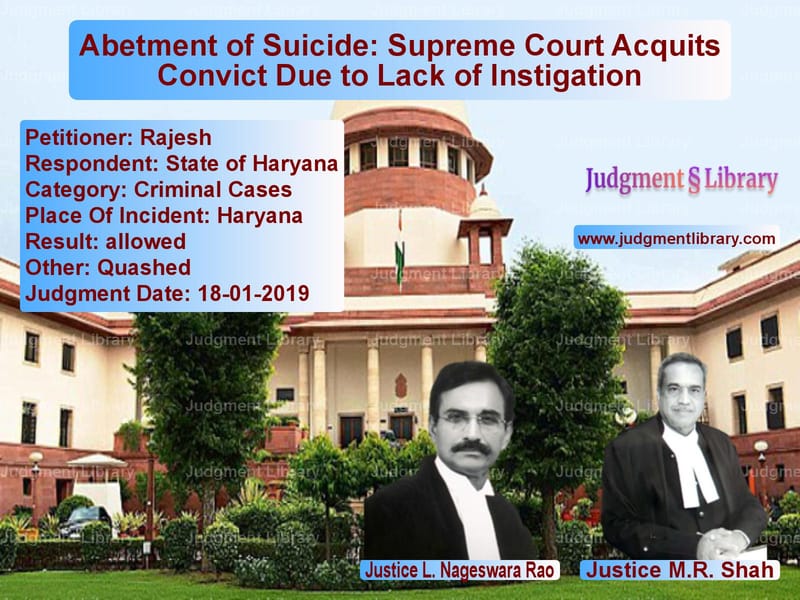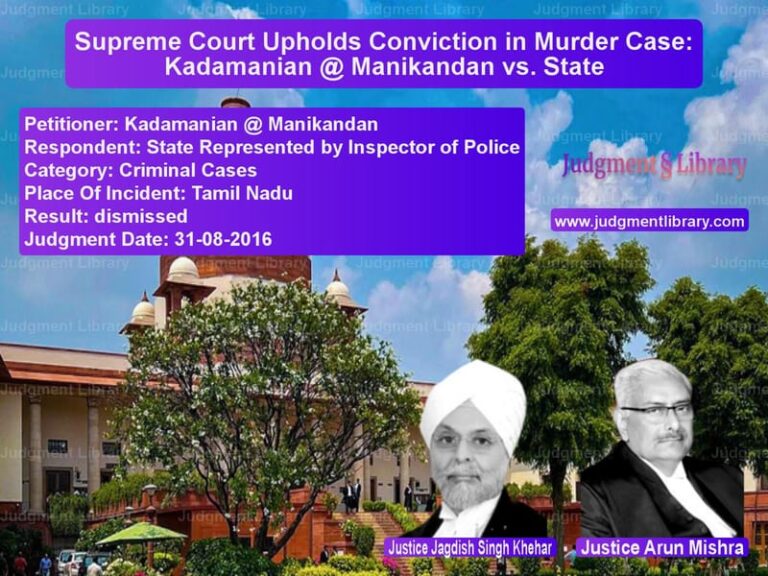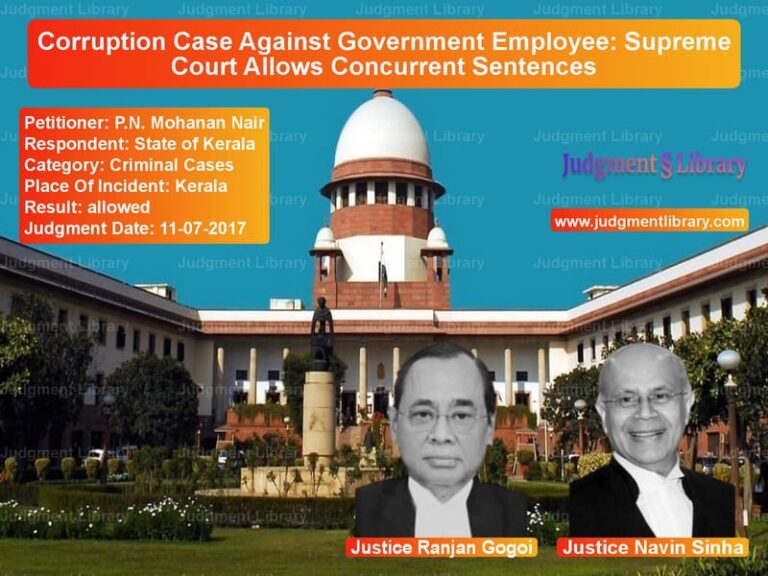Abetment of Suicide: Supreme Court Acquits Convict Due to Lack of Instigation
In a significant judgment, the Supreme Court of India acquitted a man convicted under Section 306 of the Indian Penal Code (IPC) for abetment of suicide. The case, Rajesh vs. State of Haryana, revolved around the alleged harassment of the deceased, Arvind, by his in-laws, which supposedly led to his suicide. However, the Court found that there was no direct provocation or instigation from the accused that could justify the conviction.
Background of the Case
The case stemmed from a complaint by Bharat Singh (PW-1), the father of the deceased. Arvind had married Manju, the daughter of Laxmi Narayan, on November 7, 2000. On February 23, 2002, Arvind committed suicide by consuming poison. A week later, his family found a suicide note in his room, in which Arvind blamed his father-in-law (Laxmi Narayan), his brother-in-law (Rajesh – the appellant), and his sister-in-law (Indera) for his death.
The prosecution claimed that Arvind was facing constant threats from his in-laws, who falsely accused him of dowry demands. A Panchayat meeting was convened in September 2001, where the appellant, Rajesh, allegedly slapped Arvind and warned him of legal consequences. These events, according to the prosecution, drove Arvind to take his own life.
Trial Court Verdict
The Trial Court convicted Rajesh, Laxmi Narayan, and Indera under Section 306 IPC. Rajesh and Laxmi Narayan were sentenced to five years of rigorous imprisonment, while Indera was sentenced to three years. The court emphasized that Arvind had faced continuous threats from his in-laws, which led him to take the extreme step.
High Court Decision
The High Court, while reviewing the case, acquitted Laxmi Narayan and Indera but upheld Rajesh’s conviction. The court relied heavily on the suicide note and the testimony of key witnesses, particularly PW-1 (Bharat Singh). It ruled that Rajesh’s act of slapping Arvind during the Panchayat meeting played a role in his mental distress, contributing to his suicide.
Key Arguments by the Petitioner (Rajesh)
- The Panchayat incident occurred five months before the suicide, and there was no direct link between the two events.
- Mere allegations of threats and accusations of dowry demands do not constitute instigation under Section 306 IPC.
- There was no direct evidence proving that Rajesh actively encouraged Arvind to take his life.
- Since Laxmi Narayan and Indera were acquitted despite facing similar charges, Rajesh should not have been singled out.
Arguments by the Respondents (State of Haryana)
- Arvind’s suicide note explicitly named Rajesh and his in-laws as the cause of his suffering.
- The appellant’s act of slapping Arvind in front of the village Panchayat was humiliating and mentally distressing.
- Arvind was under constant psychological pressure from Rajesh and his family, pushing him towards suicide.
Supreme Court’s Observations
The Supreme Court, led by Justice L. Nageswara Rao and Justice M.R. Shah, analyzed the evidence and came to the following conclusions:
“Conviction under Section 306 IPC is not sustainable on the allegation of harassment without there being any positive action proximate to the time of occurrence on the part of the accused, which led or compelled the person to commit suicide.”
The Court further noted:
“In order to bring a case within the purview of Section 306 IPC, the person who is said to have abetted the commission of suicide must have played an active role by an act of instigation or by doing certain acts to facilitate the commission of suicide.”
Regarding the Panchayat incident, the Court ruled:
“There is no proximity between the Panchayat held in September 2001 and the suicide committed by Arvind on February 23, 2002. The incident of slapping by the appellant cannot be the sole ground to hold him responsible for instigating the deceased to commit suicide.”
Additionally, the Court cited previous judgments that clarify the legal definition of instigation:
“To constitute ‘instigation’, a person must provoke, incite, urge, or encourage another to do an act. Words uttered in a fit of anger or emotion without intending the consequences to actually follow cannot be said to be instigation.”
Final Verdict
The Supreme Court ruled in favor of Rajesh, stating:
“We are not in agreement with the findings of the Trial Court that the deceased committed suicide due to continuous threats by the accused regarding his being implicated in a false case of demand of dowry.”
“The evidence does not disclose that the appellant instigated the deceased to commit suicide. There was neither a provocation nor encouragement by the appellant to the deceased to commit an act of suicide.”
The Supreme Court set aside the conviction and ordered that Rajesh be acquitted.
Legal and Social Implications
- The judgment reinforces the principle that abetment to suicide requires active instigation.
- Mere allegations of harassment, without concrete evidence of provocation, cannot lead to a conviction under Section 306 IPC.
- The ruling also clarifies that events months before a suicide cannot automatically be linked to the act unless there is a clear causal connection.
This case serves as an important precedent in defining the scope of abetment to suicide under Indian law.
Petitioner Name: Rajesh.Respondent Name: State of Haryana.Judgment By: Justice L. Nageswara Rao, Justice M.R. Shah.Place Of Incident: Haryana.Judgment Date: 18-01-2019.
Don’t miss out on the full details! Download the complete judgment in PDF format below and gain valuable insights instantly!
Download Judgment: Rajesh vs State of Haryana Supreme Court of India Judgment Dated 18-01-2019.pdf
Direct Downlaod Judgment: Direct downlaod this Judgment
See all petitions in Suicide Cases
See all petitions in Bail and Anticipatory Bail
See all petitions in Judgment by L. Nageswara Rao
See all petitions in Judgment by Mukeshkumar Rasikbhai Shah
See all petitions in allowed
See all petitions in Quashed
See all petitions in supreme court of India judgments January 2019
See all petitions in 2019 judgments
See all posts in Criminal Cases Category
See all allowed petitions in Criminal Cases Category
See all Dismissed petitions in Criminal Cases Category
See all partially allowed petitions in Criminal Cases Category







